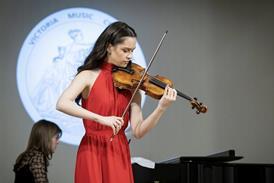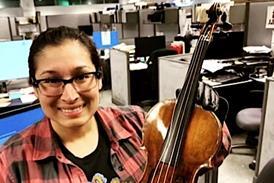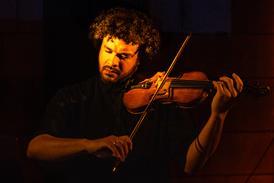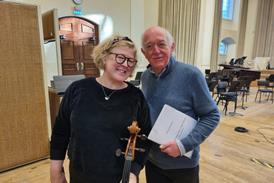Violinist Maren Bosma offers seven helpful tips to make practice sessions fun, varied and productive

1. Be comfortable not practising (as much)
It can sometimes be difficult for classical musicians to step away from their instrument occasionally and to prioritise other things; especially under the ever-increasing pressure to achieve the highest possible standard at all times. But as in many other areas, quality is more important than quantity. When practice feels like a chore, it can negatively affect our relationship with practice, performance and even music in general in the long run. It’s healthy to invest in being a well-rounded person, to have other interests and to go out and experience things instead of spending hour after hour in a practice room. This makes us better musicians!
Read: Violinist Elena Urioste on why a thorough warm-up regimen is a necessity for good practice
Read: Making the most of one hour of practice
Read: A video-gaming approach to practice will maximise your technical efficiency
2. Listen to your body and mind
It’s important to take care of our bodies as well as our minds. If you need a break, take a break – that will enable you to do more valuable practice afterwards, rather than trying to force in another reluctant half-hour. If you feel like starting with that fun piece rather than technique warm-ups, why not use that piece as a warm-up instead? It might set a new tone for your practice session entirely. When things don’t go according to your routine, go with it and turn it into something helpful. Taking care of your body and mind this way will make your practice more joyful, mindful and productive.
3. Know what you want to achieve and how
Never just practise simply to ’get the hours in’. Know what you want to spend time on in your session, what you want to aim for and what you want to achieve. Be realistic about this so you will feel a sense of joy and accomplishment when things are moving in the direction you want. And once you’ve made your plan for the day, try to let go of the goal-oriented aspects of it during your practice. You know where you want to go; now enjoy the road there and the progress you make along the way!
4. Bring variety into your practice
Repetition is the mother of learning. However, variety is one of the most important aspects of making progress in any practice and makes it enjoyable. When the brain encounters something new, it’s much more likely to process it effectively. So go ahead and change up your practice order. Try different rhythms and reverse or change bowings for difficult passages you’re trying to learn. Sing phrases instead of playing them or, if you can, play them through on a different instrument to see how it sounds. Working this way isn’t just fun but will also give you endless possibilities to gain new insights and perspectives into the music you’re performing.
5. Practice doesn’t always involve your instrument
Mental practice is at least as important as physical practice and can be an extremely helpful tool to make physical practice sessions more useful and joyful. Listen to different recordings of music with the score and imagine yourself playing along or even playing a different part. Mental practice can also be surprisingly useful in solving physical issues. Simply meditating and imagining ourselves playing our instrument can help our bodies process what its most natural positions are. You’ll see that coming back to your instrument can feel a lot more natural, comfortable and relaxed after mental practice.
6. Practise with curiosity, not judgment
We’ve all been there: you’ve been at it for hours, you’re getting tired, everything sounds terrible and you think you’re never going to learn that notoriously difficult piece. While those moments can’t be avoided entirely, it’s extremely helpful to take a curious approach to your practice rather than a judgmental one. Keep messing up those double-stops? Losing count in that fast bit? Or getting a bow shake in a long note? Take a step back, analyse how your body feels, where you’re holding tension and what exactly is happening in the moment where things stop working. Treat yourself as you would a young student who is just learning to play. Most obstacles can be solved with enough attention to detail, something which can only be achieved if you stop to wonder about those details.
7. Imagine yourself on stage
For many musicians, performing is the highest joy of all, much more so than what happens in the practice room. But when you’re in your practice room it can be invigorating as well as extremely helpful to imagine yourself in a big concert hall and play the music just as you would in that moment – minus the pressure or stage fright. Or, even better: play to people occasionally to share the joy!
Maren Bosma is the artistic creator and concertmaster of the newly revived Bath Festival Orchestra: https://bathfestivalorchestra.com



































No comments yet